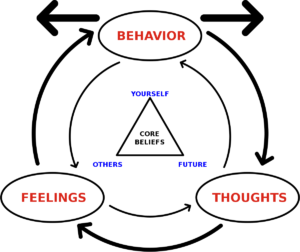Behavioral therapy is a type of psychotherapy that focuses on the relationship between thoughts, feelings, and behaviors. It is a very popular treatment option for mental health disorders. There are many different types of behavioral therapy, so it can be difficult to decide which one is right for you. In this blog post, we will discuss 11 of the most common types of behavioral therapy and their respective benefits.
Contents
- 1 What Is Behavioral Therapy?
- 2 Types of Behavioral Therapy
- 2.1 Cognitive Behavioral Therapy (CBT)
- 2.2 Dialectical Behavior Therapy (DBT)
- 2.3 Exposure Therapy
- 2.4 Flooding
- 2.5 Systematic Desensitization
- 2.6 Habit Reversal Training (HRT)
- 2.7 Imaginal Exposure Therapy
- 2.8 In Vivo Exposure Therapy
- 2.9 Rational Emotive Behavior Therapy (REBT)
- 2.10 Token Economy
- 2.11 Contingency Management
- 2.12 Virtual Reality Exposure Therapy (VRET)
- 3 How To Select Form Different Types of Behavioral Therapy For You?
- 4 Common Benefits of Different Types of Behavioral Therapy
- 5 Conclusion
What Is Behavioral Therapy?
 Behaviors are learned. That’s the basis for behavioral therapy, also called behaviorism. It’s a type of psychotherapy that assumes maladaptive, or bad, behaviors can be replaced with healthy ones. The goal is to make changes in your environment that will help you adopt new, healthier behaviors and thought patterns.
Behaviors are learned. That’s the basis for behavioral therapy, also called behaviorism. It’s a type of psychotherapy that assumes maladaptive, or bad, behaviors can be replaced with healthy ones. The goal is to make changes in your environment that will help you adopt new, healthier behaviors and thought patterns.
People use this type of therapy so that they can:
- Change behaviors that are hurting their lives
- Stop maladaptive behaviors, such as those that are harmful to themselves or others
- Learn new, healthy coping mechanisms and ways of thinking
- Manage anxiety, depression, OCD, and other mental health conditions
Behavioral therapy is usually short-term. That’s because the focus is on changing specific behaviors. It’s typically done in an outpatient setting, but it can also be done in a hospital or residential treatment facility. You might see a behavioral therapist individually or in a group.
There are many reasons why your behavior is causing you distress or making it hard for you to function in your everyday life. Maybe you have a problem with alcohol or drugs. Or, you might have trouble controlling your anger. You may even engage in self-destructive behaviors, such as cutting yourself.
Types of Behavioral Therapy

Fortunately, many types of behavioral therapy can help you change the way you think and behave. Here are 11 of the most common:
Cognitive Behavioral Therapy (CBT)
Cognitive behavioral therapy is one of the most popular types of behavioral therapy. It’s effective for treating a wide range of mental health conditions, including anxiety, depression, eating disorders, and substance abuse. CBT focuses on changing negative thought patterns and unhealthy behaviors. This type of therapy is usually short-term, and it’s often done in a group setting.
Dialectical Behavior Therapy (DBT)
DBT is a type of cognitive behavioral therapy that was specifically designed to treat borderline personality disorder. It’s also been shown to be effective for treating eating disorders, depression, and anxiety. DBT focuses on teaching you skills to help you manage your emotions and cope with stress. This type of therapy is usually done in an outpatient setting, but it can also be done in a residential treatment facility. You might see a therapist individually or in a group.
Exposure Therapy
 Anxiety disorders can be very debilitating, preventing people from living their lives to the fullest. Exposure therapy is a type of behavioral therapy that can help people manage their anxiety by gradually exposing them to the things they fear in a safe and controlled environment. This type of therapy is very effective in treating anxiety disorders.
Anxiety disorders can be very debilitating, preventing people from living their lives to the fullest. Exposure therapy is a type of behavioral therapy that can help people manage their anxiety by gradually exposing them to the things they fear in a safe and controlled environment. This type of therapy is very effective in treating anxiety disorders.
This type of behavior therapy works to change the way a person responds to their triggers by slowly exposing them to them in a safe and controlled environment. The goal is to help people manage their anxiety so that it no longer prevents them from living their lives. This therapy is very effective in treating anxiety disorders.
Flooding
Another type of behavior therapy used to treat anxiety is known as flooding. Flooding involves exposing a person to their fear in a very intense way all at once. This type of therapy can be very effective but it is also very intense and should only be done with the guidance of a trained therapist.
The work of this therapy is to change the way a person responds to their triggers by exposing them to them in an intense way all at once. The goal of this type of therapy is to help people manage their anxiety so that it no longer prevents them from living their lives. Though this therapy can be very effective, it is also very intense and should only be done with the guidance of a trained therapist.
Systematic Desensitization
Somewhere in the middle of exposure therapy and flooding lies systematic desensitization. This type of behavior therapy combines elements of exposure therapy and flooding to help people manage their anxiety. Systematic desensitization involves gradually exposing a person to their fear in a safe and controlled environment.
The work of this therapy is to change the way a person responds to their triggers by slowly exposing them to them in a safe and controlled environment. The goal is to help people manage their anxiety so that it no longer prevents them from living their lives. This type of therapy combines elements of exposure therapy and flooding to be effective.
Habit Reversal Training (HRT)
 Habits can be hard to break, but habit reversal training (HRT) is a type of behavior therapy that can help people break their bad habits. HRT works by teaching people new and healthy habits to replace their old ones. This type of therapy is very effective in treating anxiety disorders.
Habits can be hard to break, but habit reversal training (HRT) is a type of behavior therapy that can help people break their bad habits. HRT works by teaching people new and healthy habits to replace their old ones. This type of therapy is very effective in treating anxiety disorders.
The work of this therapy is to change the way a person responds to their triggers by teaching them new and healthy habits. The goal is to help people manage their anxiety so that it no longer prevents them from living their lives. This type of therapy is very effective in treating anxiety disorders.
Imaginal Exposure Therapy
Imaginal exposure therapy is a type of behavioral therapy that involves imaginary reliving a traumatic experience to lessen its emotional impact. This type of therapy can be used to treat conditions such as post-traumatic stress disorder (PTSD) and phobias.
In imaginal exposure therapy, the individual will work with a therapist to recount the details of their trauma in a safe and controlled environment. The therapist may also help the individual create a “hierarchy” of feared situations, starting with those that are least anxiety-provoking and working up to those most distressing.
The individual will then be asked to imagine s in these situations, starting with the least anxiety-provoking one.
In Vivo Exposure Therapy
In vivo exposure therapy is another type of exposure therapy that uses real-life situations to help people manage their anxiety. This type of therapy can be used to help people with a wide range of anxiety disorders, including phobias, OCD, and generalized anxiety disorder.
In vivo exposure therapy is usually conducted in two phases. In the first phase, you will work with your therapist to identify your fear hierarchy. This is a list of the things that make you anxious, starting with the things that cause you the least amount of anxiety and working up to the things that cause you the most anxiety. Once your fear hierarchy is established, you will begin gradually exposing yourself to the items on your list.
For example, gradually exposing snakes, your therapist may start by having you look at pictures of snakes. Once you can do this without feeling too anxious, you may move on to watching videos of snakes. Eventually, you may work up to touching a snake or being in the same room as a snake. The goal of exposure therapy is to help you learn that your anxiety will decrease over time and that you can manage your anxiety in situations where you would normally feel paralyzed by fear.
Rational Emotive Behavior Therapy (REBT)
 Rational emotive behavior therapy, or REBT, is a type of cognitive-behavioral therapy that focuses on helping people to challenge irrational beliefs. These are the beliefs that can lead to negative emotions and unhealthy behaviors.
Rational emotive behavior therapy, or REBT, is a type of cognitive-behavioral therapy that focuses on helping people to challenge irrational beliefs. These are the beliefs that can lead to negative emotions and unhealthy behaviors.
REBT is based on the premise that our thoughts, not our circumstances, determine our emotional state. Therefore, if we want to change our emotional state, we need to first change our thoughts. This may sound like a difficult task, but REBT is an effective treatment for a wide range of mental health conditions, including depression, anxiety disorders, eating disorders, and substance abuse disorders.
Token Economy
A token economy is a type of behavior modification program that uses positive reinforcement to encourage desired behaviors. In a token economy, people are given tokens (such as points, stars, or chips) for displaying desired behaviors. These tokens can then be exchanged for various rewards (such as privileges, activities, or tangible items).
Token economies have been used in a variety of settings, including schools, workplaces, hospitals, and prisons. They are an effective way to modify behavior in both children and adults. If you are looking for a way to change your behavior or the behavior of someone you know, consider using a token economy.
Contingency Management
Contingency management is another type of behavior modification program that uses positive reinforcement to encourage desired behaviors. In contingency management, people are given rewards (such as privileges, activities, or tangible items) for displaying desired behaviors.
Contingency management is an effective way to modify behavior in both children and adults. If you are looking for a way to change your behavior or the behavior of someone you know, consider using contingency management.
Virtual Reality Exposure Therapy (VRET)
In VRET, you are repeatedly exposed to a situation that causes you anxiety in a controlled and safe virtual environment. This can help you overcome your fear by gradually getting used to the trigger and learning that it is not dangerous. VRET is usually done with the help of a therapist who can guide you through the process and provide support.
In this type of therapy, you will be exposed to the trigger situation in a controlled and safe environment. This can help you overcome your fear by gradually getting used to the trigger and learning that it is not dangerous. VRET is usually done with the help of a therapist who can guide you through the process and provide support.
How To Select Form Different Types of Behavioral Therapy For You?

Selecting a therapy that is right for you can be overwhelming. With so many different types of therapy to choose from, it’s difficult to know where to start. The most important thing is to find a therapist that you feel comfortable with and who has experience treating the type of problem you are experiencing.
There are many factors that you will want to consider when choosing a therapist. Some of these are:
Budget
One of the main considerations when choosing a therapist is your budget. Therapy can be expensive, so it’s important to find a therapist who you can afford. There are many ways to pay for therapy, such as insurance, sliding scale fees, and payment plans. Sometimes there may be many therapists available to you, but they may not all be in your price range.
Location
Another important consideration is location. You will want to find a therapist who is conveniently located for you. If you live in a rural area, you may have to travel further to see a therapist. This can be difficult if you don’t have transportation or if the weather is bad. Also, some therapists only see patients during business hours, so if you work full-time, you may have to miss work to see them.
Type of Therapy
There are many different types of therapy, and each one is suited for different problems. If you are struggling with anxiety, you may want to try cognitive behavioral therapy. If you are dealing with depression, you may want to try interpersonal therapy. There are also many specialized therapies, such as art therapy or dance therapy. It’s important to find a therapist who specializes in the type of problem you are experiencing.
Schedule
Another thing to consider is your schedule. You will want to find a therapist who has appointments that fit into your schedule. Some therapists only see patients during business hours, while others have evening and weekend appointments. You will also want to find a therapist who has availability when you need it.
These are just some of the factors to consider when choosing a therapist. The most important thing is to find someone who you feel comfortable with and who has experience treating the type of problem you are experiencing.
Common Benefits of Different Types of Behavioral Therapy

There are many types of behavioral therapy, each with its own unique set of benefits. Here are some of the most common benefits associated with different types of behavioral therapy:
Makes you more aware of your thoughts and behaviors: Cognitive behavioral therapy (CBT) is one of the most popular types of behavioral therapy. CBT helps you to become more aware of your thoughts and behaviors, and how they affect your mood and overall wellbeing.
Helps you to identify and manage stressors: Stress management therapy (SMT) is designed to help you identify the sources of stress in your life, and develop coping mechanisms to deal with them.
Teaches you new skills: Skills training therapies such as dialectical behavior therapy (DBT) or social skills training (SST) teach you new skills that can help you to better cope with difficult situations.
Improves communication and relationships: Communication is a key part of any relationship, and therapies such as couples therapy or family therapy can help to improve communication and resolve conflict.
Boosts self-esteem and confidence: Therapies that focus on building self-esteem and confidence, such as assertiveness training or positive reinforcement, can be extremely helpful in improving your overall well-being.
There are many other types of behavioral therapy, each with its unique benefits. If you’re considering seeking treatment, it’s important to speak with a mental health professional to find the right type of therapy for you.
Conclusion
Behavioral therapy is a great way to improve your mental health and well-being. It can help you learn how to cope with stress, anxiety, and depression. There are many different types of behavioral therapies, so it is important to find the right one for you. If you are not sure which type of therapy is right for you, speak to your doctor or mental health professional. They will be able to help you find the right type of therapy for your needs.
Behavioral therapy can provide excellent results for those struggling with their mental health. If you or someone close to you needs assistance, please don’t hesitate to reach out to a professional. Help is available, and people do recover from mental illness with the proper treatment.
Hope this article was of help to you! If you are suffering from mental health disorders, you may seek help from Therapy Mantra. We have a team of highly trained and experienced therapists who can provide you with the tools and skills necessary for overcoming mental health issues. Contact us today to schedule an online therapy or download our free Android or iOS app for more information.


